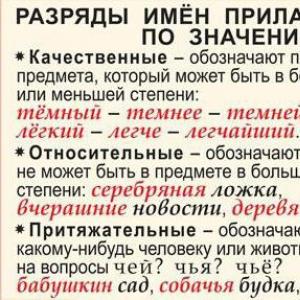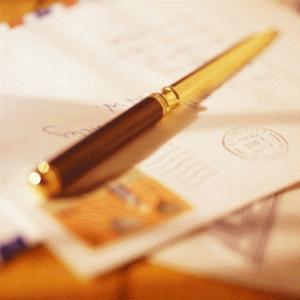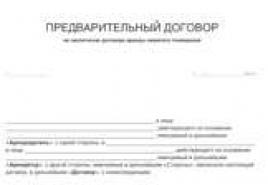Health certificate for kindergarten. Help for kindergarten after illness. What tests do you need to take to get a certificate for kindergarten?
Now your child has grown up enough to go to kindergarten, where experienced and attentive educators will teach him the art of communication, develop the necessary skills and abilities, accustom him to a routine, and teach him new games and activities. But visiting a children's group also entails certain disadvantages, the main one being that the child gets sick more often. It is difficult to argue with this obvious fact - in kindergarten there are indeed ideal conditions for diseases to easily spread from child to child. And now the mother is on sick leave, and the child is undergoing treatment.
But attending kindergarten is as compulsory as attending work as an adult. And the absence of a child for more than three days must be documented. Of all the medical certificates for kindergarten, the most in demand is a sickness certificate. It is issued if the child missed classes in kindergarten due to an acute or chronic illness, and the countdown begins from the date of contact with the pediatrician. The pediatrician issues such a certificate after examining the child, when he is absolutely sure that the baby is completely healthy and can attend the children’s group again.
When else might a kindergarten certificate be required?
However, there are other reasons why a child may need a medical certificate from a pediatrician. For example, you decide to go on vacation or just have a vacation.In this case, the doctor will give you a pediatrician's certificate after the break. It differs from other medical certificates in that instead of a diagnosis it will indicate that the child is healthy and can attend kindergarten after a break.
Such a certificate must include a dermatologist’s note confirming the absence of skin diseases and lice. If a child has not attended kindergarten for more than a month, you will need a medical certificate about the epidemiological environment (no contact with sick people for 21 days), and you will also need to take a stool test for helminth eggs and a scraping for enterobiasis.
Finally, you have been informed that your child has been given a long-awaited place in kindergarten. Now it is important to take the last step in time - to register a new child at the child care institution.
To register, you need to go to an appointment with the manager with a package of documents. Below we provide two lists of documents.
A package of documents for the child’s personal file:
- Application for enrollment of a child in kindergarten
- Copy of the child’s SNILS (if any) - 1 copy
- Copy of SNILS of the parent in whose name the documents are drawn up - 1 copy
- Copy of the child’s medical policy - 1 copy
- Agreement between the parent (legal representative) and the kindergarten - 2 copies, issued in the kindergarten.
- Child’s medical record (form F-026U) and preventive vaccination card (form F-063U)
- Certificate of contacts (confirming that the child is healthy and has not had contact with infectious patients. Issued immediately before the child’s first day of attending kindergarten)
- Documents confirming benefits for kindergarten fees
To provide partial compensation for kindergarten fees (provided to all children without exception):
- Copy of the child's birth certificate - 1 copy
- A copy of the passport of the parent in whose name the compensation is issued - 1 copy
- Application for transfer of compensation part of parental pay
- A copy of the first page of the savings book of the parent in whose name the compensation or details are issued plastic card indicating the personal account - 1 copy
- A copy of the birth certificate of the first child (if there are two or more children) - 1 copy
- Medical card for kindergarten (History of child development, form No. 026/u)
Why the document is needed: to admit a child to kindergarten. The card notes the child's medical history, health status and medical observation history while he is visiting the kindergarten.
Where to get the document: In the children's clinic or medical center where the child is being observed.
Doctors who need to be examined: pediatrician, neurologist, ophthalmologist, otolaryngologist, orthopedic surgeon, after three years - speech therapist.
Tests and studies: ECG, general blood test, general urine test, culture of intestinal flora, test for worm eggs, test for enterobiasis.
Children under three years of age, when obtaining a medical card, undergo a shortened program of doctors: psychiatrist, dentist, pediatrician.
Tests: for worm eggs, for enterobiasis.
There is information among parents that you can refuse to be examined by a psychiatrist or dentist in writing.
More information about medical certificates for kindergarten
- Card of preventive vaccinations (form No. 063/у)
Why the document is needed: The card records information about the child’s vaccinations. It will be needed when the child goes to kindergarten.
Where to get the document: The card is created when the newborn first comes to the children's clinic, and is filled out as vaccinations progress. It is kept in the children's clinic and, if necessary, is handed out or an extract is made from it.
- Certificate in form 095/у
Why the document is needed: Confirms that the child is healthy and can be in the children's group after illness/after the summer, and has not had contact with infectious diseases.
Where to get the document: From a pediatrician in the district clinic or medical center where the child is being observed.
- Certificate for the pool (form No. 1)
Why the document is needed: Confirms that the child is healthy, has no infectious diseases, and can engage in recreational swimming. Issued for six months, after which a new certificate must be provided to the garden.
Where to get the document: In the children's clinic or medical center where the child is being observed. Most likely, you will need to be tested for worm eggs and a scraping for enterobiasis.
- Refusal of vaccinations and the Mantoux River
Why the document is needed: A refusal must be issued if you do not plan to vaccinate your child for medical reasons (or for personal reasons), are going to be vaccinated according to an individual schedule, or do only part of the vaccinations included in the vaccination schedule. Refusal of vaccinations is your legal right; you are not required to explain or justify the reasons for your refusal.
Where to get the document: write an application in two copies addressed to the head of the district clinic where the child is being observed. You must keep one signed copy.
As a rule, the clinic has a form for registration of refusal of vaccinations. But if you were not given it, you can write a statement in the following form:
I, my full name, declare that I refuse all preventive vaccinations (vaccinations against the following diseases: scroll) for my son/daughter, full name of the child.
Reasons:
Fundamentals of the legislation of the Russian Federation on the protection of the health of citizens of July 22, 1993 No. 5487-1, articles 31 (Consent to medical intervention) and 32 (Refusal of medical intervention);
Federal Law of September 17, 1998 N 157-FZ “On immunoprophylaxis of infectious diseases”, Article 5 (Rights and responsibilities of citizens in the implementation of immunoprophylaxis)
Date, signature
Dear Parents! Let the hustle and bustle associated with waiting in line and registration for kindergarten be left behind and let your child spend a wonderful, joyful and friendly time in kindergarten! Health and happiness to your entire family!
Do you want to send your child to kindergarten? Are you getting your first grader ready for school?
One of the required documents that you will be asked for at the office is a certificate of form 26/u. It can be completed in just a few days at our medical center without any hassle.
Certificate form 26/у is a child’s health passport, reflecting current information about his condition. The document is drawn up by a pediatrician and accompanies the child from the beginning of kindergarten until graduation. The certificate contains important information for health workers at the educational institution the child attends.
- Physiological parameters (height, weight).
- Past infectious diseases.
- Results of routine medical examinations, tests, ECG, ultrasound and other studies.
- The presence of chronic diseases, mental disorders, developmental disorders.
- Diet recommendations, physical activity(health group).
- Information about vaccinations received or lack thereof.
Where to get a certificate for school or kindergarten
Medical examination when registering for kindergarten includes:
- examination by 7 specialists:
- dentist,
- neurologist,
- orthopedic surgeon,
- ophthalmologist,
- otolaryngologist,
- speech therapist;
- general blood and urine tests;
- blood sugar test;
- analysis for helminth eggs;
- smear for enterobiasis.
Before entering first grade, you must visit specialized specialists: dentist, neurologist, ophthalmologist, otolaryngologist, pediatrician, orthopedist, psychologist, dermatologist, etc. In addition to standard tests, you need to undergo an ECG and EchoCG of the heart and ultrasound internal organs. In the presence of a chronic disease, a conclusion from the attending physician is required. Contact our medical center - our doctors are always very attentive to their patients.
Medical examination of schoolchildren is carried out as follows:
- The examination of the main specialists includes consultations with a pediatric urologist/gynecologist, endocrinologist, gastroenterologist, immunologist and orthodontist.
- Ultrasound of internal organs.
- ECG and EchoCG.
- Blood and urine tests, including sugar tests.
- Fluorography.
- Analysis of stool for worm eggs.
- Enterobiasis smear.
Based on the results of the medical examination, the pediatrician enters into the chart a complete diagnosis and recommendations for physical activity and regimen, correction of disorders, and improvement of the child’s health.
What to do if there is no vaccination certificate?
A vaccination certificate is a mandatory component of the certificate form 026/у. If it is not there, it is replaced by an appropriate document, for example, an extract from the child’s development history. If parents are opposed to vaccinations, their written refusal is issued.
Expiration date of a child's school certificate
Please note that test results are considered valid for 3 months, and fluorography results for a year. You should keep your medical record for as long as possible: its data may be needed to make a diagnosis in adulthood.
Why do many parents choose our medical center?
- Possibility to undergo a full medical examination in 3-4 days.
- The completed certificate is accepted by all educational institutions.
- Reception is conducted by all specialized children's specialists.
- High diagnostic accuracy.
- Reasonable prices.
The long-awaited day has come! They called you and informed you that you must come and get a ticket to the preschool educational institution, and then go and register your child for kindergarten. To enroll a child in a preschool educational institution, as is known, it is necessary to provide the head of the child preschool a number of certificates, documents and statements. Let's consider in detail how and where to get them.
What documents and certificates are needed for kindergarten
Ticket to kindergarten
To register a child for kindergarten, parents must go to the education department and get a ticket to the preschool educational institution. Please note that this document is valid for only 10 days. You also need to remember that if all the necessary certificates and documents are not collected during this time, the voucher will be canceled and the place in the preschool educational institution will go to another child. Immediately after receiving the voucher, you must contact the head of the child care institution to clarify what is needed for your child to enroll in kindergarten.
“Admission documents are submitted to the educational organization to which a referral was received as part of the implementation of state and municipal services provided by executive authorities of the constituent entities of the Russian Federation and bodies local government for accepting applications, registering and enrolling children in educational organizations, implementing the main educational program preschool education(kindergartens)" (order of the Ministry of Education and Science Russian Federation dated April 8, 2014 No. 293).
Medical card No. 026
To visit a children's group, you must issue a medical card No. 026, which will contain information about the baby's health. To receive it, you need to go to a children's clinic. The medical record contains information about the child’s health, infectious diseases he has suffered (for example, whooping cough, scarlet fever, diphtheria, rubella, mumps, hepatitis, typhoid fever, rheumatism, tuberculosis). This medical document must record the results of the examination of the child:
- lore;
- ophthalmologist;
- speech therapist (only for children over 3 years old);
- neurologist;
- dermatologist;
- dentist;
- orthopedic surgeon.
Visiting doctors can take a long time due to the fact that there are usually many people waiting in line to see these specialists.
What tests need to be taken for kindergarten - standard list
Also, to obtain a medical card, the baby will have to do tests:
- blood (total, sugar);
- urine (general);
- feces for helminthiasis.
In addition, the child will need to undergo a culture test for intestinal microflora and a scraping for worm eggs, a nasal and throat swab for diphtheria (in the absence of vaccinations against diphtheria), and an ECG.
The last step in obtaining a medical card for a kindergarten will be a visit to the pediatrician, who will write a conclusion about the baby’s health in this document. Then the local doctor will send the parent to the head of the clinic, who must put the final stamp on the medical card. But if, as a result of examination, a child has worms, lamblia, or diseases that require emergency treatment, the pediatrician will recommend undergoing special course therapy. After recovery, the tests will need to be taken again.
Vaccination card No. 063
The medical record must be supplemented with a vaccination certificate, which contains data on the vaccinations performed, indicating the names of vaccinations and the dates of their administration. The vaccination card also contains information about the baby’s body’s reaction to each vaccine. A vaccination card is created for the baby while still in the maternity hospital, and then forwarded to the clinic where the baby belongs at his place of residence. Usually, by the age of 2-3 years, a child is vaccinated against hepatitis B, tuberculosis, whooping cough, diphtheria, tetanus, polio, and measles. 

If the parents, for any reason, did not vaccinate their child, then a card No. 063 is also issued for such a child. A form indicating refusal of routine vaccination is pasted into it. But in this case, parents first need to write a statement in 2 copies addressed to the head of the clinic, in which they must attest to their refusal to vaccinate their baby. You must keep one of the signed documents for yourself.
Certificate No. 095/у
After receiving a medical card and vaccination card, certificate No. 095/u is issued. This document is valid for only a few days, and it confirms that the child has not been in contact with infectious patients. This certificate is issued at the clinic.
Other documents
In addition to the certificates described above, when enrolling in a preschool educational institution, the head of the kindergarten will need to present the following documents:
- mom's or dad's passport;
- baby's birth certificate;
- compulsory medical insurance policy (copy);
- documents evidencing benefits for paying for preschool education (if any).
Applications, agreement, questionnaires
Application for admission
After checking the availability of all documents and certificates, the head will offer to write to the parent an application for admission of the child to the preschool educational institution. This document indicates the details of mom and dad, their place of work, telephone numbers, as well as the number and series of the passport of the parent who is filling out the application.
Consent to the processing of child data
In the office of the kindergarten manager, the parent will be asked to write an application for the processing of his child’s data. It should be remembered that whether to sign or not to sign this document is up to each parent to decide for himself. This consent document gives the right to employees of a child care institution to enter the child’s data in a journal, use photographs of the child, and submit his work to competitions.
Agreement between preschool educational institution and parents
When registering a child for kindergarten, it is mandatory that a parent signs an agreement that stipulates financial, organizational, and educational issues related to the child’s stay in a preschool educational institution.
How to get compensation for kindergarten fees
Decree of the Moscow Government of February 13, 2007 No. 90-PP: “1.3. The recipient of compensation for part of the parental fee is one of the parents (legal representatives) who paid the parental fee for the maintenance of the child in the state educational institution, implementing the main general education program of preschool education, located on the territory of the city of Moscow (hereinafter referred to as the recipient of compensation). 1.4. Compensation for part of parental fees is set at:
- 1.4.1. 20 percent of the paid parental fee is for the first child.
MEDICAL DOCUMENTS,
necessary when a child enters kindergarten
The hardest and most important thing is over - your baby has finally been given a place in kindergarten. Now it is important to have time to complete the medical documents required upon admission without unnecessary worries: medical card, annex to it - a vaccination card or a vaccination refusal form.
What is important to know:
- Registration of a medical card will take time, because... the child must be examined by at least 7 specialists;
- You can apply for a card at the clinic where your child is assigned. First, you need to visit a pediatrician, who will create this card, enter all the necessary information about the child there and give directions for tests and to specialists who are required to be seen upon admission to kindergarten.
- If you do not have the time or opportunity to see specialists and apply for a card at a city clinic, then you can do this at a non-state children's or family clinic for a fee. On average in Moscow, a one-time visit to a specialist costs from 1,000 to 3,000 rubles. Some clinics offer a “children’s medical examination in 1 day” service, where you can quickly see all the necessary doctors and issue a medical card for kindergarten at a discount.
*At the bottom of the page you will find useful information about new ways to make an appointment with a doctor at a children's clinic
So, let’s take a closer look at the medical documents themselves.
Child's medical record according to form 026/у
The child’s medical record or form 026/u reflects the child’s health status over time. This document is issued after a comprehensive medical examination of the child and is periodically supplemented with new data. The card is most often issued at the clinic at your place of residence. This card must include all age-required vaccinations, indicate weight, height, age, parents' full names, contact numbers, and a copy of the insurance policy; specialist examination data. Typically, the examination is carried out, in addition to the pediatrician, by a surgeon, ophthalmologist, otolaryngologist, neurologist, dermatologist and orthopedist. In some cases, dental, speech therapy and psychological therapy are also provided. child health analysis. Each of the medical professionals listed here makes his own objective judgment about one or another aspect of the child’s health, recording it on the medical card form. The conclusion of a specialized doctor may consist of the word “healthy,” but if some problems do occur, then a specific diagnosis and medical recommendations are indicated in the medical record. These recommendations may sometimes include exemption from classes. physical culture etc. During the medical examination, the child undergoes blood, urine and stool tests, and sometimes an enterobiasis test.
Further, all the results of routine medical examinations carried out within the kindergarten and school will also be entered into the card. The child’s medical card also includes a vaccination calendar and medical certificates issued to the child, test results, extracts and other medical documents.
There is a specific schedule for children's medical examinations. Thus, it is assumed that such examinations will take place before entering kindergarten, twice during the child’s visit to kindergarten, upon transition to school, in the first year of school, and then at ten, twelve and sixteen years. Accordingly, after the child graduates from school, form 026/у-2000 is completely filled out with data.
The medical record is a book in A4 format. Appearance and the rules according to which form 026/у-2000 is filled out are established by the Ministry of Health of the Russian Federation in the form of the corresponding Order (order number - 241). Doctors of any medical institutions accredited to issue such certificates can issue and fill out medical certificates of form 026/u. Most often, the preparation of such documents is carried out by pediatricians or attending physicians of a narrow specialization who observe the child.
The card is accompanied by form 063/у (vaccination card)
Accordingly, it contains information about preventive vaccinations that were given to the child with dates.
Over the last few years, the issue of issuing medical documents for a child whose parents have refused vaccinations has become very relevant.
With that in mind, let's look at what parents who prefer their children not to receive vaccinations need to know. In the Russian Federation, it is legally stipulated that a child’s medical record (form 026/u) may contain as an attachment a form of refusal to immunize. It is known that the issuance of certificate 026/у is initially carried out at the local children's clinic by a pediatrician or chief physician. Further stages of filling out the medical certificate “form 026/u” are carried out by medical workers of the educational institution (kindergarten or school). It is characteristic that the issuance of certificate 026/у must be carried out based on the requirement to accurately reflect the entire range of therapeutic and preventive measures carried out in an educational institution. Accordingly, if there is a form for parents refusing vaccinations for a child, health workers should not make any notes on the vaccination calendar. Every parent should know that a waiver of vaccinations is signed once, and any attempts by medical workers to require a repeated refusal to be written are legally unjustified.
The form for refusing vaccinations is written to the head physician of the clinic in the form of a statement indicating the surname, first name, patronymic and registration address of the parent. The body text is not limited to any particular form of writing. However, it must unambiguously indicate the refusal of all preventive vaccinations for the child (or the specific vaccinations that are being refused must be listed), indicating the child’s last name, first name and patronymic, as well as his address and year of birth. At the request of the parents, the refusal form can also include the reason for refusing vaccinations and the age at which the child reaches this refusal. However, these points are not mandatory.
The vaccination refusal form is signed by the chief physician of the medical institution with the note “Refusal accepted for a period of time...” indicating the period of validity of this refusal and is certified by a seal. According to the law, the chief physician does not have the right to refuse to accept parents’ refusal to vaccinate their child, since they have such a right. To avoid bureaucratic problems, it is best to fill out the refusal form in two copies, one of which should be given to the clinic, and the other kept with you in case you have to prove the fundamental existence of this refusal.







